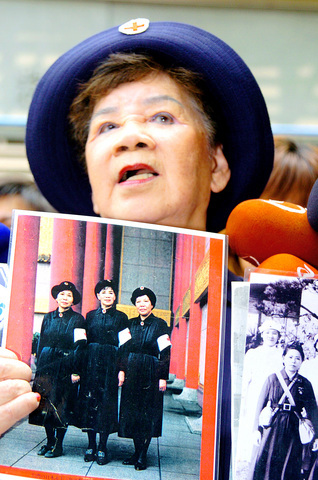A coalition of veterans who served in the Japanese military during World War II and their families protested outside the legislature yesterday, voicing support for Taiwan Solidarity Union (TSU) Chairman Shu Chin-chiang's (蘇進強) visit to Tokyo's Yasukuni Shrine.
Bearing banners with the words "ignorant, audacious May Chin (
May Chin on Tuesday evening led protesters at CKS International Airport to meet Shu and eight other TSU members returning from Japan. Shu was jostled by the protesters and pelted with eggs as he headed for the exit.

PHOTO: SEAN CHAO, TAIPEI TIMES
The Yasukuni Shrine is dedicated to Japan's 2.5 million war dead and lists the names of 28,000 Taiwanese and 21,000 Korean soldiers, most of whom were forced to serve in the Japanese army.
Yesterday's protest later moved into the legislature to hold a press conference at the TSU caucus office. Taiwanese independence activist Su Beng (史明) said the Chinese Nationalist Party (KMT) should be held responsible for the controversy over Shu's visit to the shrine.
"Not only does Shu's trip make sense, but the timing was also right," he said. "I don't understand why Taiwanese people cannot pay respect to our own people."
Su said the Chinese Nationalist Party (KMT) government maliciously abandoned Taiwanese veterans after World War II ended.
About 200,000 Taiwanese were recruited as "volunteers" to fight for the Japanese in Southeast Asia during the war. About 30,000 died.
Instead of bringing the remaining 170,000 survivors home, the KMT government turned its back on them, Su said.
Chen Chun-chin (
"I don't know why it is wrong to visit my old comrades or let others pay their respects to them on my behalf," said Chen, 81, who survived the war after serving for one-and-a-half years.
Chen said his association had asked previous KMT governments on three occasions to seek compensation from the Japanese on their behalf, but to no avail.
"Then-premier Lien Chan (
TSU caucus whip Lo Chih-ming (羅志明) said that his party would endeavor to help Taiwanese men forced to serve as Japanese soldiers and Taiwanese women who served as sex slaves to seek compensation from the Japanese government.
Lo also said that his party would collect information on the 28,000 Taiwanese whose names are listed at the Yasukuni Shrine and build a shrine for them in Taiwan.
Chairwoman of the Association for Taiwan Independence Yin Tsu-chi (
"If she's speaking for the Chinese, I don't think she's qualified," Yin said. "If she's speaking for the Taiwanese, she seems to be clueless about the history of Taiwan and Taiwanese values."

MAKING WAVES: China’s maritime militia could become a nontraditional threat in war, clogging up shipping lanes to prevent US or Japanese intervention, a report said About 1,900 Chinese ships flying flags of convenience and fishing vessels that participated in China’s military exercises around Taiwan last month and in January last year have been listed for monitoring, Coast Guard Administration (CGA) Deputy Director-General Hsieh Ching-chin (謝慶欽) said yesterday. Following amendments to the Commercial Port Act (商港法) and the Law of Ships (船舶法) last month, the CGA can designate possible berthing areas or deny ports of call for vessels suspected of loitering around areas where undersea cables can be accessed, Oceans Affairs Council Minister Kuan Bi-ling (管碧玲) said. The list of suspected ships, originally 300, had risen to about

DAREDEVIL: Honnold said it had always been a dream of his to climb Taipei 101, while a Netflix producer said the skyscraper was ‘a real icon of this country’ US climber Alex Honnold yesterday took on Taiwan’s tallest building, becoming the first person to scale Taipei 101 without a rope, harness or safety net. Hundreds of spectators gathered at the base of the 101-story skyscraper to watch Honnold, 40, embark on his daredevil feat, which was also broadcast live on Netflix. Dressed in a red T-shirt and yellow custom-made climbing shoes, Honnold swiftly moved up the southeast face of the glass and steel building. At one point, he stepped onto a platform midway up to wave down at fans and onlookers who were taking photos. People watching from inside

Japan’s strategic alliance with the US would collapse if Tokyo were to turn away from a conflict in Taiwan, Japanese Prime Minister Sanae Takaichi said yesterday, but distanced herself from previous comments that suggested a possible military response in such an event. Takaichi expressed her latest views on a nationally broadcast TV program late on Monday, where an opposition party leader criticized her for igniting tensions with China with the earlier remarks. Ties between Japan and China have sunk to the worst level in years after Takaichi said in November that a hypothetical Chinese attack on Taiwan could bring about a Japanese

The WHO ignored early COVID-19 warnings from Taiwan, US Deputy Secretary of Health and Human Services Jim O’Neill said on Friday, as part of justification for Washington withdrawing from the global health body. US Secretary of State Marco Rubio on Thursday said that the US was pulling out of the UN agency, as it failed to fulfill its responsibilities during the COVID-19 pandemic. The WHO “ignored early COVID warnings from Taiwan in 2019 by pretending Taiwan did not exist, O’Neill wrote on X on Friday, Taiwan time. “It ignored rigorous science and promoted lockdowns.” The US will “continue international coordination on infectious